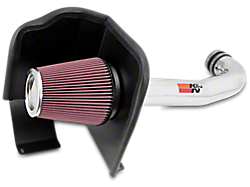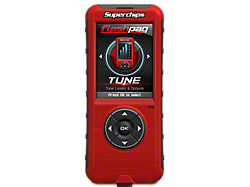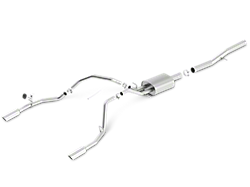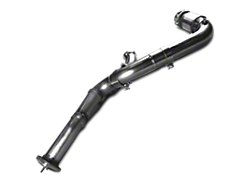What is an Ignition System?
Your ignition system is responsible for, you guessed it, igniting your internal combustion engine. The ignition system is composed of many parts such as the battery, rotor, distributor, spark plugs, ignition coil, and control module.
It all starts at the ignition coil, which transmits low voltage electricity from your battery and turns it into high voltage electricity. This connects to the distributor, which feeds the electricity to the spark plugs through a set of wires. The spark plugs use this power to ignite the fuel mixture inside your engine.
The main goal of the ignition system is to fire at the right time so gas can combust at the optimal fuel/air ratio. A misfired engine will cost you power and fuel economy, and depending on how bad the misfire, it could lead to engine damage.
To produce more horsepower and torque in your engine, the ignition must fire at just the right time to maximize pressure in your engine cylinders during the power stroke. This refers to engine timing, which should occur just before the piston reaches the top of the cylinder so it has pressure aiding it on its downward stroke.
Since fuel burns at a constant pace, your ignition must adjust to the speed of the pistons to provide spark at the right time. This is referred to as advanced spark.
Essentially, the spark must occur in more rapid iterations to account for the piston’s speed. There is an equation to better understand timing. To calculate the work your ignition has to do you’d multiply pressure by distance. More specially, work equals the pressure of the piston in the cylinder multiplied by the length it travels on each stroke.
Timing is important to maintaining your internal Silverado 1500’s combustion cycle. Timing should relatively be consistent unless your air intake runs too lean or rich. In that case you should take it to a mechanic where he or she will adjust the timing in the cylinders and distributor.
Getting More Performance from your Silverado 1500 Ignition System
Benefits of an Upgraded Ignition System
- More efficiency
- More revs
- Easy conversion
- Less maintenance if switching to an electronic ignition system
Probably the first upgrade to consider is swapping out those spark plugs. Upgrading to iridium or platinum spark plugs will make your ignition more responsive while consuming less voltage.
These plugs also last longer than standard copper or nickel alloy plugs. You’ll need to consult the owner’s manual before doing this to understand whether your ignition system can handle a larger spark gap or heat range.
What you’ll want out of a spark plug is a sharp edge that allows current to flow much more easily. These spark plugs are also the most durable. A spark plug with a small diameter reduces the voltage required from your battery to complete a combustion cycle.
You can also improve the performance of your vehicle by adjusting your timing, as previously mentioned.
Spark wires with an ignition amplifier can give your engine more power, especially in heavy duty trucks with lots of cargo. You can improve your performance with a new distributor or ignition box.
The ignition box is usually pretty durable and only recommended for Silverado owners who are rebuilding or swapping out their engine. If you’re still not getting the desired performance you want out of your ignition, you can try new ignition coils or even a stronger battery. Generally, we recommend a new ignition coil if your Silverado has trouble while idling or accelerating.
Upgrading Your Silverado 1500’s Ignition Coils
Speaking of performance, ignition coils have been proven to deliver more horsepower to engines that employ them right. What you’re aiming for is an ignition coil that delivers voltage under load so it can perform consistently from idle to redline. With more windings, upgraded ignition coils can distribute electricity more efficiently in a smaller housing to give your vehicle more power.
Upgrading Your Silverado 1500’s Spark Plugs
Spark plugs are obviously one of the most important and overlooked components of your vehicle. It’s almost always the first thing you think of when a piston misfires or your Silverado’s transmission fails to accelerate up a hill.
Material is everything for a spark plug. A stronger metal allows for greater conduction and a smoother transfer of electricity. In turn, this improves combustion. Your standard spark plug is made of copper, which is a great electrical conductor and also great for emissions. There are four metals typically used for spark plugs, which are rated from worst to best material:
- Copper
- Single platinum
- Double platinum
- Iridium
Iridium tipped plugs are much more resistant to corrosion and seizing than a copper plated spark plug. Iridium and platinum also conduct heat transfer more smoothly than copper. Some iridium spark plugs are rated to last 25% longer than standard platinum spark plugs.
Understanding Spark Plug Heat Range
Heat range simply refers to the temperature your spark plug tip works best at. More specifically, it refers to the speed the tip can transfer heat to the cooling system. This does not affect combustion, although combustion affects heat range.
You’ve probably heard of spark plugs that are colder or hotter. Colder plugs are recommended for forced induction engines that require rapid heat transfer at high RPMs. It's also necessary for burning off carbon deposits.
On the other hand, a hotter spark plug is ideal for daily drivers who don't need to run their Silverados that hard. One way to look at heat range is by the length of the spark plug tip. A longer tip will be classified as a hotter spark plug in most cases because it takes longer for heat to transfer to the cooling system, leaving the spark plug hotter.
You can identify heat range right on your spark plug’s serial number. Certain ignition systems require a different heat range, so be sure to assess your owner’s manual or talk to a mechanic before making the swap.
Understanding Spark Plug Gapping
Another important factor to consider when upgrading your spark plugs is plug gapping. This gap is simply referred to as the distance between the center and two side electrodes. They need to be even in order for your ignition to fire correctly.
Subsequently, a longer spark plug gap will require more voltage to account for the distance, so there are trade offs for shortening or increasing the length of the gap. You should never lengthen the gap by even as much as two millimeters as this will cause issues with firing.
You can check your spark plug gap by using a feeler gauge. You’ll need to consult a chart to find the right gap.
If your gauge wire doesn't go all the way through the spark plug or if it goes through, but doesn't touch any electrodes, then your gap is off. If it’s too narrow, you’ll need to widen the gap using your feeler gauge to softly tug on the electrode to lengthen the gap. If it’s too wide then you’ll need to press the side electrode down and bend it toward the center electrode on a mar-proof surface to close the gap.
Shop All Truck Accessories & Parts
Fitment Includes
- 1999, 2000, 2001, 2002, 2003, 2004, 2005, 2006, 2007, 2008, 2009, 2010, 2011, 2012, 2013, 2014, 2015, 2016, 2017, 2018, 2019, 2020, 2021, 2022, 2023 and 2024 Silverados
- LT Z71, LTZ, Z71, LTZ Z71, WT, Work Truck, XFE, Hybrid, Lingenfelter Reaper, Custom, Special Ops Edition, High Country, LS, LT Silverados
- Engines: 4.3L Vortec V6, 4.8L Vortec V8, 5.3L Vortec V8, 5.3L Flex-Fuel Vortec V8, 6.0L VVT Vortec V8, 6.2L VVT Vortec V8, 4.3L EcoTec3 V6, 5.3L EcoTec3 V8, 6.2L EcoTec3 V8 Silverados
*Please see Silverado parts pages for any exceptions.





